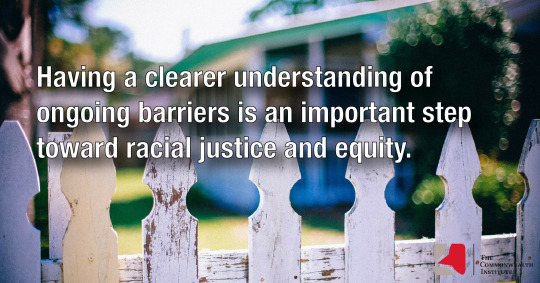August 7, 2018
Racial Inequity Has Serious Consequences for Black Men
Virginia should be a place where every family can benefit from the economy, find adequate housing, and get a good education. Many Virginians can; however, over 920,000 hardworking Virginians live in poverty, which limits opportunities for themselves, their families, and their communities.
Less than 9 percent of white Virginians live in poverty. Yet, similar to the rest of the country, people of color experience higher rates of poverty – 20 percent of Black Virginians and 15.5 percent of Hispanic Virginians. To lower these rates for people of color, we need to give more attention to communities that disproportionately experience poverty as a result of the historical and systemic racism they have endured. Anti-poverty programs and assistance are indispensable to help low-income Virginians make ends meet, yet ensuring widespread economic security in the long run is difficult without considering policies that create meaningful opportunities for the particular racial groups and subgroups that face the greatest barriers to reaching their full potential.
This spring, researchers from Stanford, Harvard, and the Census Bureau completed an extensive study on race, income, and mobility in the United States. By examining intergenerational data, the groundbreaking study found that Black men fare significantly worse than their white counterparts when they reach adulthood, even when their parents have the same income, their family has a similar structure, and their education levels are similar. Black boys raised in wealthy families with similar levels of education are still more likely than similarly situated white boys to fall into poverty, while Black boys raised in poverty are more likely to stay there. Although Black women face unique obstacles, Black and white girls raised with the same income as children have incomes that are similar to one another in adulthood. This means that the income gap between similarly situated white and Black people is largely due to racial biases and systemic barriers for men.
We can see the effects of these barriers close to home. In Virginia, 17 percent of Black men live in poverty, compared to 7.5 percent of white men. This is a significant imbalance, created by the multitude of factors that push and keep more Black men and boys in poverty than their white counterparts. Effective solutions can raise Black men’s incomes – a crucial leg up for Black families throughout the state and a boost to Virginia’s economy.
However, trends of systemic racism unfairly impact Black communities, keeping Black rates of upward mobility low. For instance, Black children represent the majority of students at Virginia’s high-poverty schools which have fewer resources. Increasing funding to these high-poverty schools has the potential to improve outcomes and increase earnings through better jobs when kids reach adulthood, which could mean a lot for Black boys.
Mass incarceration is another significant hurdle for Black men across the country. One study found a strong relationship between childhood poverty and incarceration in adulthood, and incarcerated Black men are at an extreme disadvantage, as they receive prison sentences almost 20 percent longer than white men with similar cases. Incarcerating Black men has serious implications for Black communities, as well as their families and future employment. There is evidence that parental incarceration creates childhood trauma for kids. Meanwhile, certain laws prevent people who were convicted of certain drug-related offenses from getting aid through anti-poverty programs, such as Temporary Assistance for Needy Families.
In Virginia, 10.5 percent of Black men are unemployed, compared to 5 percent of white men. This disparity is a result of the systemic issues and racial discrimination that bars Black men from employment – jobs that can potentially lift them out of poverty and close the Black-white income gap. Research shows that employers favor white individuals over Black and Hispanic job applicants, and there’s been no decline in discrimination against Black applicants since 1989. One study found that even white men with criminal records were more likely to receive a positive response from employers, including a call back, than equally qualified Black men without criminal records. And when Black men do get hired, their wages are only about 70 percent of what their white peers and colleagues make on average.
The significant barriers that work against Black Americans have big consequences for Black boys. While other racial groups face distinct challenges, the study found that income and wealth disparities are especially pronounced for Black communities. For example, Black and Hispanic Americans currently have comparable incomes, but Hispanic Americans have higher rates of upward mobility which could potentially narrow the Hispanic-white income gap if maintained.
Fortunately, researchers also identified certain U.S. neighborhoods where there were better outcomes for Black boys, resulting in smaller Black-white income gaps. And those neighborhoods – ones with low poverty, low racial biases among whites, and where male mentors had a strong presence in low-income communities – can give us guidance on how to boost opportunity for Black boys and reduce Black-white income gaps. All Black boys are subject to these trends, regardless of their socio-economic status, so it is important to implement policies and programs that support their upward mobility. Focused neighborhood efforts, like mentorship programs and initiatives to decrease racial biases, can reap benefits for Black boys and men regardless of their background.
While there remains a lot of work to be done on reversing generations of disadvantages, having a clearer understanding of the ongoing barriers and most vulnerable populations is an important step toward racial justice and equity. Virginia should be a place where every family can benefit from the economy, find adequate housing, and get a good education. And it can become that place by eliminating the unjust obstacles that create unequal outcomes.

Category:
Economic Opportunity

